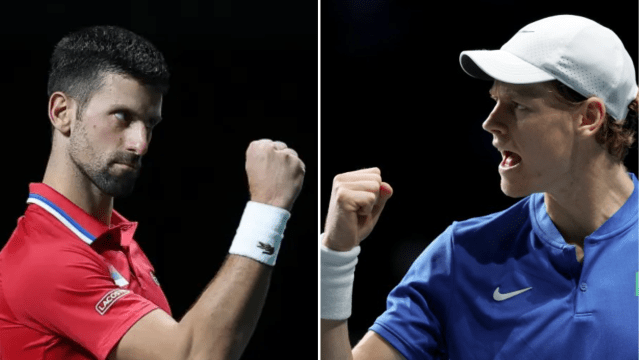ROD LAVER ARENA — There are no statistics for nerves. Beyond live heart-rate data or adrenalin monitoring (and who knows, maybe one day), it is impossible to know for sure whether you can blame nerves for a performance, but that’s what it looked like for Carlos Alcaraz.
Last year at the French Open, Alcaraz’s body convulsed with cramp after only two sets of tennis which he admitted afterwards was caused by the tension of the match.
Alcaraz had played, and beaten, Alexander Zverev before, including in grand slam quarter-finals, but never with the German in such good form – and crucially never without his coach there to guide him through it.
Juan Carlos Ferrero, who started working with the Spanish talent before he had even won an ATP match, was nowhere to be seen on Rod Laver Arena. The former world No 1 had knee surgery last month and was unable to travel to Australia, sending Samuel Lopez, who also worked with Alcaraz last summer while Ferrero was on holiday.
In Canada last year, Alcaraz called Ferrero his “second father” because he taught him “first things about everything”.
And in Australia, his absence was keenly felt.
“[When Ferrero is there] you can see him give positive direction and give some words of coaching that might get him focused on a single strategy. Alcaraz is clearly flustered,” said ex-player John Millman, who only retired last week, on Channel Nine’s coverage.
Alcaraz, as you might expect, did insist otherwise.
“It didn’t affect [me] at all. I was playing great tennis without him [before the quarter-finals],” Alcaraz said.
“Samuel is a pretty good coach as well and I trust him 100 per cent, as I said before the tournament.”
Instead, he was merely “sad” with his level of tennis, and it was “a shame” the way he started the match.
Alcaraz added: “In general, I leave the tournament happy for getting to this level. I played great matches and obviously the quarter-final of a grand slam is good. It’s not what I am looking for but it’s not bad.”
But Alcaraz could not muster such a philosophical attitude in the heat of the moment. Instead, everything seemed against him. He complained about the balls getting big and fluffy, he incurred the wrath of the umpire by taking more than 30 seconds between serves and he even got frustrated with the surface, pointing at invisible imperfections or bad bounces that almost certainly weren’t there. The 20-year-old looked lost, almost petulant.
But there was also the small matter of Zverev playing astonishingly well. In the first and second set, he missed only four first serves out of 39, and behind those 35 serves he only lost six points.
Things cooled a little in the third set but barely, and the German was still making virtually no errors from the baseline, while Alcaraz passed the 30-mark well before the match was two hours old.
It had taken Alcaraz 47 minutes to wake up at all, losing eight of the first 11 games, but he seem to have finally thrown off the heavy cape of pre-match nerves when he found his range on the forehand and produced a signature stretching volley that painted the line. A point later, his famous dropshot was in action and he sealed the game with an ace, his first of the match.
Five minutes later, he had his first break points with another pinpoint forehand finding the corner of the court. Zverev was tough enough to save both of them but Alcaraz had at least found some rhythm and a way to neutralise the German’s cannon-like serve.
Or so it seemed. It was in fact a false dawn. His serve did not relent until it came to serving for the match at 5-3 in the third, when Alcaraz found the freedom of a condemned man and dragged himself back into the match. In the resulting tie-break, it was Zverev’s turn to be nervous, losing seven straight points to blow a 2-0 lead.
But the German has been there, and done that. He is now back in the Australian Open semi-finals four years after his first one, and from that Alcaraz can take much solace: this is a marathon, not a sprint, and Alcaraz will have many more chances to keep running. For this year in Melbourne though, his race is run.

